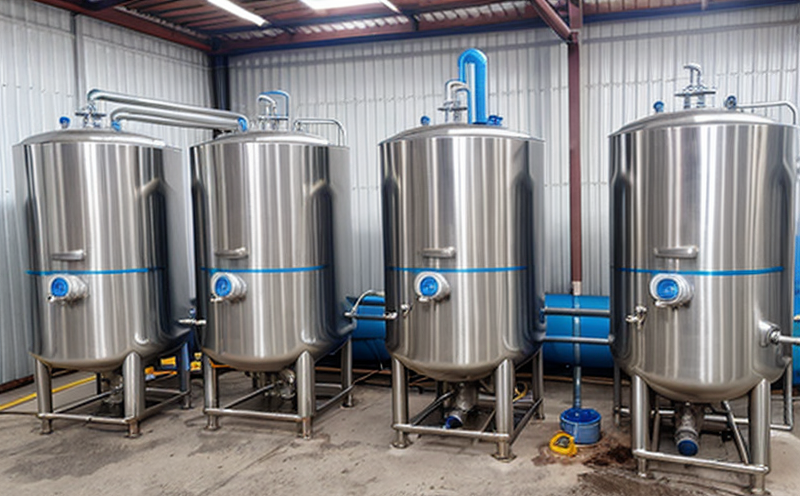ASTM D7687 Corrosion and Scale Inhibitor Efficiency Test in Cooling Water
The ASTM D7687 test is a critical procedure used to evaluate the efficiency of corrosion and scale inhibitors in cooling water systems. This testing is essential for ensuring that the chemical treatment methods are effective, thereby extending the operational life of equipment such as heat exchangers, condensers, and boilers.
Cooling water systems play a vital role in industrial processes by transferring excess heat away from production facilities. However, these systems can be susceptible to corrosion and scaling, which can lead to increased maintenance costs, reduced efficiency, and even system failures. To mitigate these risks, chemical inhibitors are often used. The ASTM D7687 test provides a standardized method for assessing the performance of these inhibitors under conditions that closely mimic real-world scenarios.
The test involves the preparation of cooling water containing specific concentrations of calcium carbonate (CaCO3) and magnesium hydroxide (Mg(OH)2), which are common contributors to scale formation. The specimen is then treated with a corrosion and scale inhibitor, and after exposure under controlled conditions for 14 days at 50°C, the samples are analyzed using scanning electron microscopy (SEM). This process allows for the visualization of both the inhibition of corrosion and the prevention or reduction of scale deposition.
The ASTM D7687 test is particularly useful in industries such as power generation, petrochemicals, and manufacturing where large-scale cooling water systems are employed. By ensuring that the inhibitors perform effectively, these facilities can achieve significant operational improvements and cost savings. The results from this test provide quality managers, compliance officers, R&D engineers, and procurement teams with valuable insights into the efficacy of their chosen chemical treatments.
Compliance with industry standards such as ASTM D7687 is crucial for maintaining regulatory adherence and ensuring product reliability. This testing procedure helps facilities stay ahead of potential issues by providing a proactive approach to equipment maintenance and operational efficiency.
Benefits
- Ensures the effectiveness of corrosion and scale inhibitors in real-world conditions.
- Aids in extending the operational life of cooling water systems, reducing maintenance costs.
- Provides a standardized method for comparing different inhibitor products.
- Facilitates compliance with industry standards and regulatory requirements.
- Supports continuous improvement and optimization of chemical treatment programs.
Why Choose This Test
The ASTM D7687 test is chosen for its reliability and accuracy in assessing the performance of corrosion and scale inhibitors. The standardized procedure ensures consistent results across different laboratories, making it a trusted method within the industry.
This testing offers several advantages over other methods. Firstly, it simulates real-world conditions, providing more accurate predictions of inhibitor effectiveness under operational stress. Secondly, the use of SEM allows for detailed visualization of scale and corrosion prevention, offering insights into the molecular mechanisms at play. Additionally, compliance with ASTM D7687 ensures that facilities meet regulatory standards, thereby minimizing legal risks and ensuring product reliability.
For quality managers and compliance officers, this test offers a clear path to demonstrating adherence to industry best practices. R&D engineers can use the results to refine their inhibitor formulations, while procurement teams benefit from data-driven decisions regarding chemical supplier selection.
Environmental and Sustainability Contributions
- Promotes efficient use of water resources by optimizing chemical treatments.
- Reduces waste generation through targeted inhibition of corrosion and scale.
- Supports the reduction of greenhouse gas emissions by prolonging equipment life.
- Fosters a culture of sustainability in industrial operations.
The ASTM D7687 test plays a crucial role in contributing to environmental sustainability. By ensuring that cooling water systems operate efficiently, this testing helps reduce the overall water footprint of industrial processes. The prevention and reduction of corrosion and scale also contribute to minimizing waste generation, as it reduces the need for frequent maintenance and replacement of equipment.
Moreover, by extending the operational life of critical infrastructure such as boilers and heat exchangers, the ASTM D7687 test supports efforts to reduce greenhouse gas emissions. Longer-lived equipment means fewer replacements and lower carbon footprints associated with manufacturing new components. This aligns with broader sustainability goals in industrial operations.





